|
|
|
Sort Order |
|
|
|
Items / Page
|
|
|
|
|
|
|
| Srl | Item |
| 1 |
ID:
152202
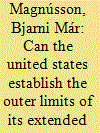

|
|
|
|
|
| Summary/Abstract |
Although most provisions of the United Nations Convention on the Law of the Sea are regarded customary international law and the United States views most of its provisions as such, the outsider status of the United States causes problems in some areas, especially concerning the continental shelf beyond 200 nautical miles. This article asks whether it is possible for the United States to establish the outer limits of its continental shelf beyond 200 nautical miles in line with international law without becoming a state party to the convention, and if that is possible, how could the United States proceed?
|
|
|
|
|
|
|
|
|
|
|
|
|
|
|
|
| 2 |
ID:
076459
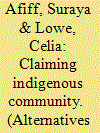

|
|
|
| 3 |
ID:
157032
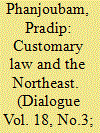

|
|
|
| 4 |
ID:
163234
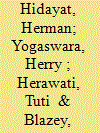

|
|
|
|
|
| Summary/Abstract |
This paper reviews the emerging effects of the 2012 decision of the Constitutional Court of Indonesia relating to the customary management of Indonesia's traditional forests. It focuses on the challenge of moving from legal to political and societal recognition of Indigenous peoples’ rights. In its advocacy of customary land rights, Aliansi Masyarakat Adat Nusantara (AMAN) successfully applied to the Constitutional Court for judicial review of the Forest Law 41 1999. It argued the law breached the constitutional rights of its members in permitting the state to permit exploitation and development rights over traditional forest without their consent. The flow‐on effect of allocating such rights included widespread deforestation and land use change without agreement from customary communities that have used and occupied these forests for centuries, thus ignoring traditional customary law that regards these forests as the property of such communities. The paper reflects critically on international experience in the interface between legal recognition of Indigenous peoples’ rights, and their translation into sustainable and meaningful societal transformation.
|
|
|
|
|
|
|
|
|
|
|
|
|
|
|
|
| 5 |
ID:
192969
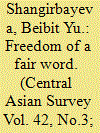

|
|
|
|
|
| Summary/Abstract |
This article examines the roots of freedom of expression and opinion, of the right to a fair trial, and of the freedom to enjoy cultural rights in Kazakh nomadic customary traditions that underlie and give meaning to human rights discourse in contemporary Kazakh society. Based on oral traditions and the perception of fairness of the nomadic Kazakhs, this rich heritage created resilient instruments that are still vital and play a significant role in the judiciary, political discussions, public debates and cultural performances in contemporary Kazakhstan. The evidence indicates that in Kazakh nomadic society a core essence of these freedoms was ‘the freedom of a fair word’, which, combined with outstanding rhetorical skills, functioned as an instrument through which civil, political and cultural rights were ensured; the concept enacted a discourse of commentary and claims-making analogous to norms of human rights. This research provides evidence for how ‘the freedom of a fair word’ was articulated by the general population in the traditional nomadic institutions of the bi, and of the zhyraus and aqyns.
|
|
|
|
|
|
|
|
|
|
|
|
|
|
|
|
| 6 |
ID:
133619
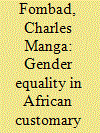

|
|
|
|
|
| Publication |
2014.
|
| Summary/Abstract |
The actual and perceived conflicts between customary law and human rights law, especially in issues dealing with gender equality, have remained a major challenge in Africa. Some of these conflicts are further complicated by the varying and contradictory interpretation of some customary laws by the courts. Different approaches have been adopted at different times and in different places to deal with some of these conflicts. One of the most controversial areas of customary law has been the traditional exclusion of women from property inheritance. This paper takes a critical look at how the courts in Botswana have dealt with the issue of the right to inherit the homestead or family home. It examines this issue in the specific context of the recent case of Ramantele v Mmusi in which the Court of Appeal had to consider the customary law rule of male ultimogeniture - which permits only the last-born son to inherit the homestead intestate to the exclusion of other siblings, especially females. It argues that courts need to be more proactive and progressive in their approach to dealing with such issues than they have been in the past in order to recognise the nature and extent of changes that are taking place today. The main lesson that can be drawn from the Botswana case is that if customary law is to survive and develop, more needs to be done to promote research and scholarship in this area and judges also need to take advantage of this research and deal with these customary law disputes with knowledge, understanding and sensitivity.
|
|
|
|
|
|
|
|
|
|
|
|
|
|
|
|
| 7 |
ID:
054225
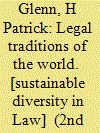

|
|
|
|
|
| Edition |
2nd ed.
|
| Publication |
Oxford, Oxford University Press, 2004.
|
| Description |
xx, 401p.
|
| Standard Number |
0199260885
|
|
|
|
|
|
|
|
|
|
|
|
Copies: C:1/I:0,R:0,Q:0
Circulation
| Accession# | Call# | Current Location | Status | Policy | Location |
| 048729 | 340.2/GLE 048729 | Main | On Shelf | General | |
|
|
|
|
| 8 |
ID:
164461
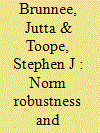

|
|
|
|
|
| Summary/Abstract |
Using the example of the right to self-defense under customary international law, we engage with questions concerning the linkage between norm robustness and legality. We draw out important differences between validity contestation and applicatory contestation within law. In so doing, we connect the international relations (IR) debate over norm robustness with our framework of interactional international law, bringing together constructivist insights into social normativity and a theory of international legality. We hypothesize that norms that meet the requirements of legality and are upheld by practices of legality enjoy “validity” and “facticity” (as defined by Deitelhoff and Zimmermann) and are “robust.” This model reveals that law operates through a continuing process of contestation. The requirements of legality impose a discipline, such that legal contestation will normally be applicatory contestation. Through practices of legality, therefore, legal norms can be maintained or shifted. However, legal norms may decay when practices of legality weaken or when challenges amount to validity contestation. The currently heightened contestation surrounding the circumstances under which the right to self-defense can be exercised against nonstate actors allows us to explore and illustrate of these dynamics.
|
|
|
|
|
|
|
|
|
|
|
|
|
|
|
|
| 9 |
ID:
122436
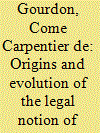

|
|
|
|
|
| Publication |
2013.
|
| Summary/Abstract |
In ancient and medieval western societies rights were prerogatives
enjoyed by the privileged minorities and by free men, as opposed to
slaves and bonded labour. By definition rights were thus unequally
distributed as males had more than women or children on whom within
their respective families, they had nearly absolute authority, just as
religious and land-owning (feudal) dignitaries held power over those
below them in the social hierarchy. Britain's coat of arms carries the
medieval motto: Dieu et mon droit, signifying "God and what I am
entitled to" by feudal or customary law or by divine right.
|
|
|
|
|
|
|
|
|
|
|
|
|
|
|
|
| 10 |
ID:
076460


|
|
|
| 11 |
ID:
190221


|
|
|
|
|
| Summary/Abstract |
Available essays on Pashtunwali describe this system of customary laws and ethics for the most part as a static model of ideal conduct, without a diachronic perspective. Offering a historical approach to Pashtunwali, this article introduces and analyzes fragmentary data on the nənawāte custom from early modern Pashto sources—historiographical narratives of the Khatak chieftains in the Tarikh-i Murassaʿ (finished 1724) and the romantic poem Adam Khan aw Durkhaney (1706/7). Recorded cases of resorting to nənawāte, considered among the main pillars of Pashtunwali but still variously interpreted, prove that this is a complex legal custom based on the right to appeal for protection, mediation, and reconciliation. As a common means of dispute settlement, nənawāte originates with a binding request for help and favor in a conflict situation. The discussion of nənawāte is preceded by a brief overview of the existing scholarly definitions of Pashtunwali, underscoring its emic perception as an ethnic identity marker.
|
|
|
|
|
|
|
|
|
|
|
|
|
|
|
|
|
|
|
|
|